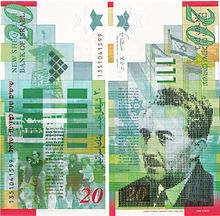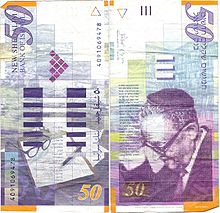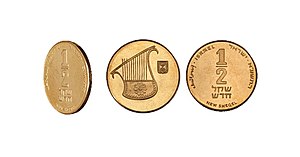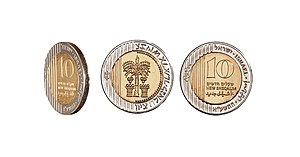Shekel
| Shekel | |
|---|---|
| Country: |
|
| Subdivision: | 100 agorot |
| ISO 4217 code : | ILS |
| Abbreviation: | NIS, |
|
Exchange rate : (29 Mar 2020) |
1 EUR = 3.9753 ILS 1 CHF = 3.6942 ILS |
The shekel ( Hebrew שֶׁקֶל, šeqel; Plural:שְׁקָלים, šqalīm) is the currency of Israel , which is also legal tender in the Palestinian Territories , Gaza Strip and parts of the West Bank .
The full Hebrew name is שקל חדש ( Shekel Chadash - New Shekel). Usually it is abbreviated with ש״ח ( chess ). The currency symbol for the shekel is ₪, a combination of the first Hebrew letters for the words shekel (ש) and chadash (ח). The Arabic name of the shekel isشيكل جديد / šīkil ǧadīd , the English name is New Israeli Sheqel , or NIS for short . The Arabic plural isشواكل / šawākil .
Shekel as weight
Shekel is a Middle Eastern measure of weight. Pieces of gold, silver, copper and tin were weighed in shekels and served as currency. In Carthage , the shekel was a sub-unit of talent .
Shekel is also reminiscent of the Hebrew word for weight, which is Mishkal. The word shekel appears several times in the Torah in relation to monetary (business) transactions, such as when Abraham bought a plot of land for the burial of his wife for 400 shekels, or in relation to the tax of half a shekel for the sanctuary.
Others
Shekel also referred to the annual membership fee for the Zionist organization introduced by the first Zionist Congress in 1897. This payment was transferred using the blank shekel , a form.
Currency and history
The New Israeli Shekel ( NIS ) was introduced on September 4, 1985 and replaced the old Shekel ( IS ) in a ratio of 1: 1000. This had only replaced the Israeli pound in a ratio of 1:10 on February 24, 1980 . These measures became necessary because of the high inflation in the 1980s.
There are banknotes of 20, 50, 100 and 200 NIS. Originally there were also 1, 5 and 10 NIS grades. Over time, these were replaced by coins. Shortly after Rabin's assassination , there were plans to issue a 500 NIS note with his portrait on it, but due to the low inflation rate, such a banknote is not needed now and in the foreseeable future. The shekel is divided into 100 Agorot (singular: Agora , Hebrew אגורה). There are coins of 10 agorot, ½, 1, 2, 5 and 10 shekels. The 1 agora coin was taken out of circulation in 1991, the 5 agorot coin was also withdrawn on January 1, 2008.
Banknotes
Series C (since 2014)
The current banknote family was introduced between 2014 and 2017, with the English name Sheqalim in Shekels and the Arabic word forشيقل to شيكل changed.
| Face value | image | size | front | back | Issue since |
|---|---|---|---|---|---|
| 20 shekels |

|
129 × 71 mm | Rachel Bluwstein , palm branches in the background | The Sea of Galilee , an excerpt from her poem Kinneret | 23rd November 2017 |
| 50 shekels |

|
136 × 71 mm | Saul Chernichovsky ; Citrus trees in the background | A Corinthian column; Excerpt from the poem In what I believe | 16th September 2014 |
| 100 shekels |

|
143 × 71 mm | Leah Goldberg , almond tree blossoms in the background | A group of gazelles, excerpt from the poem: White days | 23rd November 2017 |
| 200 shekels |
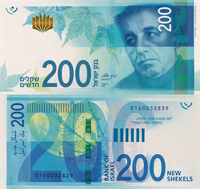
|
150 × 71 mm | Nathan Alterman , autumn leaves in the background | Moonlight flora; Excerpt from the poem Morning Song | 23rd December 2015 |
Series B (1999-2017)
| Face value | image | front | back |
|---|---|---|---|
| 20 shekels |
Moshe Sharet Prime Minister (1953–1955) |
Jewish volunteers in World War II; a watchtower, reminiscent of a tower-and-palisade settlement | |
| 50 shekels |
Samuel Agnon Nobel Prize in Literature |
Agnon's notebook, pen and glasses | |
| 100 shekels |
Jitzchak Ben Tzwi President (1952–1963) |
a synagogue in Pek'in | |
| 200 shekels |
Salman Shazar President (1963–1973) |
a street in Safed and a text from an essay by Shazar on Safed |
Series A (1985-1999)
| Face value | image | front | back | Issue since | Move in |
|---|---|---|---|---|---|
| 1 shekel | 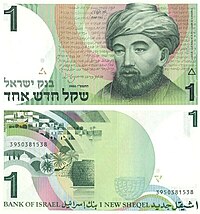 |
Maimonides | Tiberias , old stone lamp | May 8, 1986 | 1995 |
| 5 shekels | 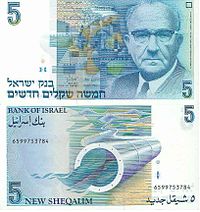 |
Levi Eschkol | National Water Carrier aqueduct , fields and barren land in the background | 4th September 1985 | 1995 |
| 10 shekels | 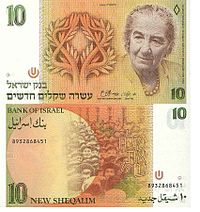 |
Golda Meir | Picture of Golda Meir in the crowd when she arrived in Moscow as ambassador in 1948 | 4th September 1985 | 1995 |
| 20 shekels |  |
Moshe Sharett | The Herzliya High School, Tel Aviv in the background | April 2nd, 1988 | July 1, 2000 |
| 50 shekels |  |
Shmuel Yosef Agnon | Jerusalem skyline, a shtetl in Eastern Europe | 4th September 1985 | July 1, 2000 |
| 100 shekels |  |
Yitzhak Ben-Zvi | Synagogue in Pek'in , with carob tree and cave, old stone lamp | August 19, 1986 | July 1, 2000 |
| 200 shekels |  |
Zalman Shazar | Girl at a desk, Hebrew block letters in the background | February 16, 1992 | July 1, 2000 |
Coins
On September 4, 1985 coins of 1, 5, 10 and 50 Agorot and 1 Shekel were issued for the first time. The 1 agora coin has not been produced since 1990, the 5 agora coin followed in 2006. The 1 agora coin was withdrawn from circulation on April 1, 1991 and the 5 agora coin on January 1, 2008 There are currently coins of 10 agorot, ½, 1, 2, 5 and 10 shekels.
| Illustration | Issue since: |
|---|---|
| 4th September 1985 | |
| 4th September 1985 | |
| 4th September 1985 | |
| December 9, 2007 | |
| 2nd January 1990 | |
| February 7, 1995 |
Coins withdrawn:
| Illustration | Issue since: | Out of course on: |
|---|---|---|
| 4th September 1985 | April 1, 1991 | |
| 4th September 1985 | January 1, 2008 |
Web links
- Image of an ancient shekel
- Article on Phoenician and Jewish shekel coins of antiquity ( Memento from July 17, 2008 in the Internet Archive )
- Article about the shekel in Moneypedia
- Shekel coins
- The banknotes of Israel
Individual evidence
- ↑ z. B. Jan Gerrit Dercksen, The old Assyrian copper trade in Anatolia. Istanbul: Nederlands Historisch-Archaeologische Instituut te Istanbul, 1996
- ↑ https://www.banknotesews.com/files/tag-israel.php

